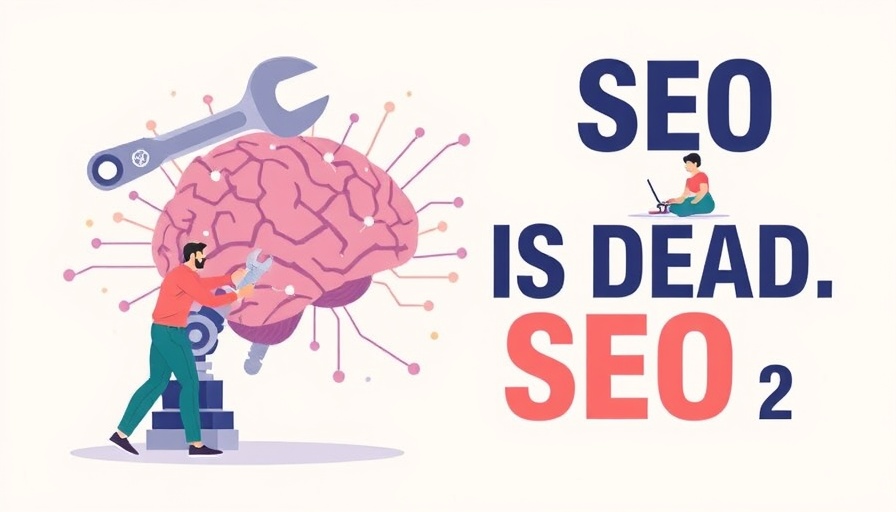
The Evolution of SEO in the Age of AI
For decades, search engine optimization (SEO) was synonymous with algorithm manipulation. Business owners often relied heavily on questionable tactics—keyword stuffing, backlink schemes, and other gaming strategies—to rank higher on search engines. However, those times are fading into the backdrop of a new digital landscape where artificial intelligence (AI) is redefining how users search and how companies adapt. This shift is not just a matter of new technology; it's a paradigm shift.
Since Google introduced its AI Overviews (AIOs) in May 2024, reports indicate that overall Google impressions surged by 49%. This surge in impressions signals a profound evolution in user behavior, as searchers are not just looking less, but are searching more deeply and engaging with the search interface in unprecedented ways. The traditional 10 blue links are making way for dynamic AI-generated summaries, which shape what users see first when they search online. Most of these AI citations—around 89%—come from sources beyond the first hundred results, indicating a larger diversity in content consumption.
How Users are Seeking Information Differently
This new search experience reflects a substantial change in how users approach their queries. While the past favored simple searches, the present has seen a remarkable 7x increase in long, complex queries of eight or more words. This shift illustrates an understanding that users are evolving into more nuanced and deliberate searchers. The adoption of iterative exploration—where users refine their searches based on AI-generated responses—allows for a deeper engagement with content. This ongoing interaction calls for brands to rethink their content strategy.
To win visibility in this new landscape, it’s no longer about simply ranking at the top; it’s about being relevant and credible enough to be cited by the AI layer that shapes the user’s first impression. Business owners must pivot their strategies away from gaming the system and instead embrace a more sophisticated understanding of audience intent.
The Shift from Strategy Gaming to Genuine Engagement
The rise of AI has obliterated many previously common SEO tactics. Gaming the algorithm with superficial tactics just doesn’t cut it anymore; instead, clarity, structure, and authority are essential to success. The most successful brands will be those that pivot their focus towards creating high-quality, insightful content that meets user needs and reflects profound expertise. Content marketers will no longer GET IT JUST RIGHT; they must embody a deeper subject understanding, moving away from merely stuffing keywords into articles.
This change emphasizes the importance of a strategic approach to content creation that embodies both quality and relevance. With the ever-evolving nature of AI, companies must continually assess and refine their strategies, ensuring their content resonates with the changing demands of users.
The Future of Search Marketing: Predictions and Trends
As AI continues to shape user search behaviors, expect to see innovations that personalize and tailor results even further. One potential development on the horizon is Google introducing features that allow users to fine-tune their results, choosing options based on preferences or specific queries. This would mark a significant step toward an interactive, user-driven search experience.
This evolution aligns with broader trends away from traditional marketing techniques and towards authentic user engagement. To thrive, businesses will increasingly need to embrace these shifts, fostering genuine connections with their audiences through valuable content that truly serves user queries.
Common Misconceptions About SEO's Future
Despite these critical insights into the evolving SEO landscape, misconceptions persist. A prevalent myth—a remnant of a bygone SEO era—is that SEO exists solely for technical experts. In reality, SEO is becoming more democratized. Business owners can contribute significantly to their visibility by ensuring that their content is not only well-structured and authoritative but also optimized for the conversational queries of their target audience.
Understanding that SEO is no longer just about technical specificity and keyword density is crucial; it’s about merging clarity with engagement to foster lasting relationships with customers.
Final Thoughts
The death of outsmarting SEO algorithms ushers in a golden opportunity for business owners looking to sustainably grow their brands. As we move deeper into the AI era, focus should shift towards providing value, building trust, and meeting user expectations. Only then can businesses thrive in an environment that is as complex as it is rewarding.
 Add Row
Add Row  Add
Add 




Write A Comment